 Petzlover
Petzlover Kromfohrlander is originated from Germany but Norwich Terrier is originated from United Kingdom. Kromfohrlander may grow 21 cm / 9 inches higher than Norwich Terrier. Kromfohrlander may weigh 10 kg / 23 pounds more than Norwich Terrier. Kromfohrlander may live 3 years more than Norwich Terrier. Kromfohrlander may have more litter size than Norwich Terrier. Kromfohrlander requires Low Maintenance. But Norwich Terrier requires Moderate Maintenance
Kromfohrlander is originated from Germany but Norwich Terrier is originated from United Kingdom. Kromfohrlander may grow 21 cm / 9 inches higher than Norwich Terrier. Kromfohrlander may weigh 10 kg / 23 pounds more than Norwich Terrier. Kromfohrlander may live 3 years more than Norwich Terrier. Kromfohrlander may have more litter size than Norwich Terrier. Kromfohrlander requires Low Maintenance. But Norwich Terrier requires Moderate Maintenance
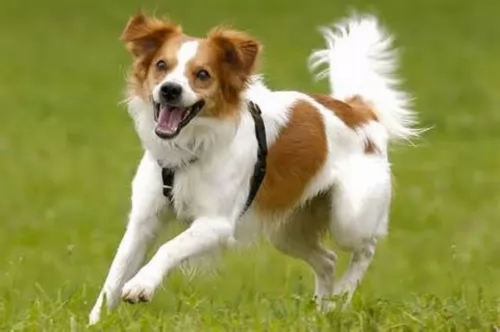 Many troops of World War 1 and World War II would have some or other mascot that they would keep close to them as a reminder of home. The mascot would also inspire them, giving them hope to endure.
Many troops of World War 1 and World War II would have some or other mascot that they would keep close to them as a reminder of home. The mascot would also inspire them, giving them hope to endure.
A Kromfohrlander dog, ‘Original Peter’ was one such mascot – a scruffy Terrier-type dog that army troops from the USA found in France.
This particular dog was accidentally mated with a Fox Terrier, with the breed essentially developing from the military dog from the 1940s. After 10 years of development, the Federation Cynologique Internationale accepted the breed in August, 1955.
It is still a rare breed, being found mainly in Germany.
 Hailing from the United Kingdom and once known as the Cantab Terrier, the Norwich Terrier may be small, but he was bred to hunt rodents.
Hailing from the United Kingdom and once known as the Cantab Terrier, the Norwich Terrier may be small, but he was bred to hunt rodents.
Closely related to the Norfolk Terrier, he is an old dog breed, having existed since the 19th century. Its understandable that such a dog would also be the mascot of Cambridge students.
It is believed that he was bred from Irish Terriers and some believe it came from the Trumpington Terrier, an extinct breed.
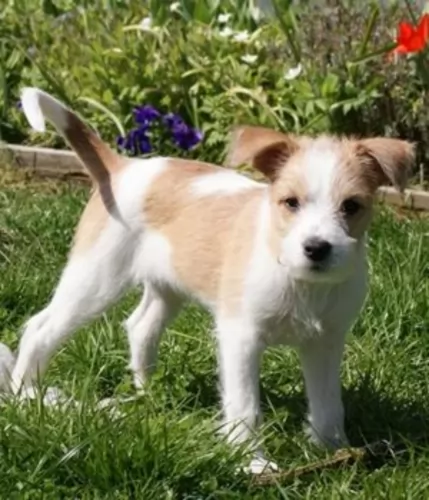 Fondly referred to as the Kromi or the Lander, the purebred Kromfohrlander, known as a companion dog, is medium sized.
Fondly referred to as the Kromi or the Lander, the purebred Kromfohrlander, known as a companion dog, is medium sized.
Both males and females stand at roughly 38 – 46cm in height and they weigh about 9 – 16kg.
They have two different coat types – the smooth haired one and the rough haired one, both coming with a soft undercoat. The dog is a moderate shedder. If you really want to be smart then the smooth coat is referred to as Glatthaar and the wire-haired Rauhaar. The color of the coat is white with brown, orange tan markings with the ears and part of the face mostly covered in the brown/tan markings.
The head of the dog is fairly round shaped and he has half-erect, half floppy ears. His legs are straight and firm and the medium length isn’t docked.
The Kromfohrlander is known for being a loving family pet that loves nothing more than staying within reach of one of his human family members. This closeness with his people means that he can adapt to life in the city or the countryside, so long as he is with his humans.
Wherever he lives though, because he is such an active dog he will require a good dose of mental- and physical stimulation. He is a docile dog, but not timid and not aggressive either, being friendly and amicable by nature. He makes a great playmate for children and is willing to get along with other pets in the home too.
 As one of the smallest terriers, the Norwich Terrier is also quite a rare dog breed. He is such a cute little dog this, weighing just 5 to 5.5kg and standing at between 23–25cm at the withers.
As one of the smallest terriers, the Norwich Terrier is also quite a rare dog breed. He is such a cute little dog this, weighing just 5 to 5.5kg and standing at between 23–25cm at the withers.
He has erect ears and a double coat that can be wheaten, red, tan, black and tan and grizzle. The tail has always been docked previously, giving the dog an attractive, compact look but these days it is left long. These dogs have small litters – usually between one and three puppies.
The Norwich Terrier is a friendly little dog and is essentially a companion to humans. Just because he is small, doesn’t mean he is frail and helpless. He is a feisty, hardy dog with a brave heart and just loves his human family.
The Norwich Terrier is also strong willed and assertive and it can be of benefit to have him trained and socialized. He is energetic too, so he’ll expect a walk each day, a run in the park and ball games. They also make excellent little watchdogs, at least warning you of approaching strangers.
They are good with kids if the children have been taught to be kind and gentle with animals, and they get on well with other pets in the home too.
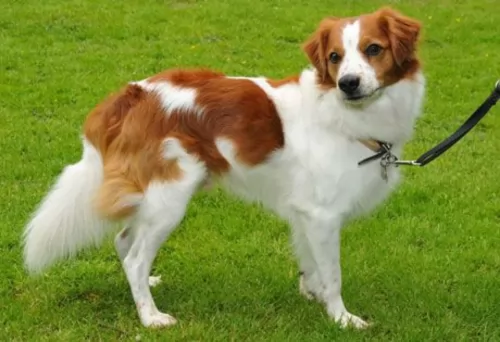 The Kromfohrländer is one of those dogs that has been bred specifically to be man’s best friend.
The Kromfohrländer is one of those dogs that has been bred specifically to be man’s best friend.
When you delve into his history you see that he has never had any particular role as a working- or hunting dog but that he has been bred to be a companion animal.
He can’t be left alone for too many hours as his very nature makes it that he longs to be around his human family constantly. He is therefore not a dependant dog, relying totally on his human family for his sense of well-being.
Low maintenance, easy-going, loving, devoted, lively and social, when you bring the medium-sized Kromfohrlander into your home, it won’t be long before he will have crept into your heart as well.
 The Norwich Terrier is guaranteed to make you a splendid pet as he is active, friendly, social and intelligent, as well as being loving and loyal.
The Norwich Terrier is guaranteed to make you a splendid pet as he is active, friendly, social and intelligent, as well as being loving and loyal.
You can rely on this little canine friend to want to be with you and take part in all your activities. He won’t do well if you put him in the back yard and forget about him, as he craves human company.
When you do whatever it takes to ensure your Norwich Terrier is an active and treasured member of your family, you’ll be rewarded with a wonderful pet and companion for many years.
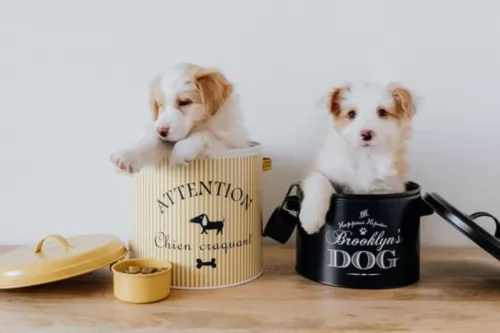 Feisty, energetic, full of life, entertaining and comical, your Kromfohrlander is intelligent too and with good care, exercise and lots of love your dog will maintain all these good characteristics and reach anything from 12 to 16 years of age.
Feisty, energetic, full of life, entertaining and comical, your Kromfohrlander is intelligent too and with good care, exercise and lots of love your dog will maintain all these good characteristics and reach anything from 12 to 16 years of age.
However, there are some dog illnesses that could affect your dog such as hip dysplasia, ear- and eye infections such as lens luxation which can actually cause loss of vision, cancer, diabetes, epilepsy, bloat and others.
Dogs that are ignored in terms of getting enough exercise are prone to weight gain and this in itself can lead to joint disease and other illnesses.
 The lifespan of the Norwich Terrier is between 11 and 13 years and he is considered a healthy breed. Every dog owner needs to know that there are some health issues which will require veterinary intervention.
The lifespan of the Norwich Terrier is between 11 and 13 years and he is considered a healthy breed. Every dog owner needs to know that there are some health issues which will require veterinary intervention.
Cataracts, an eye disease may be inherited and it is where the eye gets a cloudy look. Other illnesses to look out for include Patellar Luxation, a problem where the dog's kneecap is dislocated from its normal anatomic position. The condition is fairly common in small dog breeds.
Check problems with the teeth - more specifically incorrect bites because of how the teeth meet.
Sometimes these dogs can battle with breathing problems. Upper Airway Syndrome is when the dogs breathing is raspy.
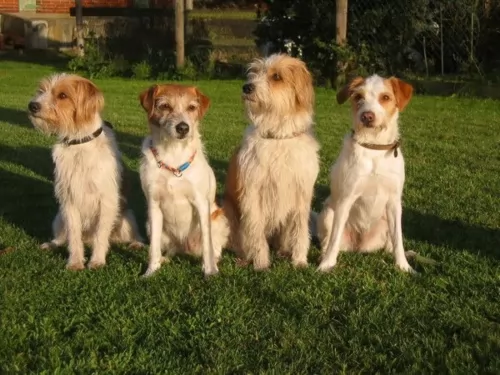 Your Kromfohrlander has two coat types - wirehaired or smooth. Don’t be overwhelmed by the brush and comb selections there are to keep his coat shiny ad healthy.
Your Kromfohrlander has two coat types - wirehaired or smooth. Don’t be overwhelmed by the brush and comb selections there are to keep his coat shiny ad healthy.
The idea is to simply choose a brush such as a bristle brush that can be used on all coat types. A brush like this will allow you to gently brush your pet’s coat to remove grass, dust and burrs and to make it a pleasant experience for your pet.
You want your Kromfohrlander to look forward to his brushing session. You can check him over for lumps, fleas and ticks at the same time.
Other grooming routines that your Kromfohrlander will need is nail clipping, checking inside and outside the ears for fleas and ticks as well as wax- and dirt build-up as well as teeth brushing. If teeth brushing for dogs is new to you there are pet groomers and even your vet who will offer this important service for you.
 Norwich Terriers are active little dogs and were bred to be working dogs – hunting vermin but also accompanying their owners on horseback. You can see that he has been used to an active lifestyle and will require a daily walk and games. He will also want toys which can keep him occupied in between his active sessions.
Norwich Terriers are active little dogs and were bred to be working dogs – hunting vermin but also accompanying their owners on horseback. You can see that he has been used to an active lifestyle and will require a daily walk and games. He will also want toys which can keep him occupied in between his active sessions.
His size allows him to adapt easily to life in the city or the countryside but wherever he is, he will need a good dose of exercise.
The double coated Norwich Terrier, with his wiry topcoat and soft undercoat will need to be brushed twice a week to avoid matting. This is a dog that will require stripping of the old hairs from the coat. This is a process which ensures the coat retaining its texture and appearance.
If you’re in any kind of doubt, speak to a professional groomer. As it is, many owners of this dog who don’t show their dogs, have them professionally groomed.
Always choose a high-quality dry food. Try and avoid those commercially manufactured foods which contain wheat and gluten and lots of preservatives and colorants. These can affect your pet’s health negatively.
Choose quality foods where protein is at the top of the list of ingredients. Give your pet some homemade food too, keeping his diet as simple and nutritious as possible. Some boiled chicken chopped up together with brown rice or pasta and some cooked vegetables such as carrots, sweet potatoes and spinach will do him the world of good.
A tiny bit of raw meat every once and again will be a good thing. Avoid foods such as chocolates, ice-cream, popcorn, onions and spicy foods as these will upset your pet’s digestive system.
Provide him with a warm, dry, soft bed. If he is outside for any length of time, make sure he has a sheltered area away from the sun and rain.